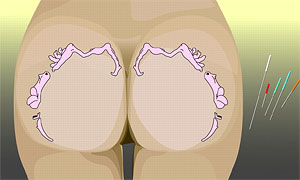Dezember
2010
Ganzheitliches Arschfummeln
Geschrieben von Michael Hohner am 12. Dezember 2010, 09:46:13 Uhr:
 |
Im Oktober 2010 fand die „International Conference on Integrative Medicine” in Jerusalem statt. „Integrative Medizin” bezeichnet den Versuch, wissenschaftliche Medizin mit allerlei Unfug zu kombinieren, hierzulande leider auch von einigen Universitäten praktiziert. Derartige Vorhaben kann man auf akademischer Basis kritisieren. Oder man kann sich damit einen Spaß erlauben, was oft lehrreicher ist.
John McLachlan bekam eine Rundmail der Veranstalter mit der Aufforderung, Abstracts für Vorträge einzureichen. McLachlan schlug daraufhin den folgenden köstlichen Vortrag vor:[1]
Intensive study of the development of early human embryos indicates that there is a reflexology style homunculus represented in the human body, over the area of the buttocks. This homunculus corresponds to areas of clonal expansion (“Blaschko lines*”), in which compartments of the body have clear ontological relationships with corresponding areas of the posterior flanks. The homunculus is inverted, such that the head is represented in the inferior position, the left buttock corresponds to the right hand side of the body, and the lateral aspect is represented medially. The Blaschko lines mediate energy flows to parent areas, and lead to significant responses to appropriate stimuli. As with reflexology, the “map” responds to needling, as in acupuncture, and to gentle suction, such as cupping. Responses are stronger and of more therapeutic value than those of auricular or conventional reflexology. In some cases, the map can be used for diagnostic purposes. In both therapeutic and diagnostic interventions, a full case history must be taken, in order to define the best methods of treatment. In the presentation, anonymised case histories, “testimonies” and positive outcomes will be presented. The methodology does not lend itself to randomised double blind controlled trials, for obvious reasons.Obviously, the involvement of a sensitive area of the body poses special challenges. Ethical practice is of significant concern. Informed consent must be obtained from all patients in writing, before either therapeutic or diagnostic procedures are commenced. Although exposure of the gluteal region is recommended, procedures can be carried out using draping if this is required in order to gain patient cooperation. Chaperones or same sex practitioners are recommended in the case of female patients.
Unfortunately, this novel paradigm may meet with closed minds and automatic rejection. Patience and understanding of “closed” mindsets is essential in order to advance this new discovery in a way commensurate with its importance.
*See for example http://dermnetnz.org/pathology/blaschko-lines.html.
McLachlan drückt hier genau die richtigen Knöpfe, um das Interesse der Veranstalter zu wecken: Er prahlt im Anschreiben mit seiner akademischen Karriere, spielt auf eine Verschwörung gegen alternative Behandlungsmethoden an, und streut die richtigen Stichworte ein. Die Immunisierungsstrategie „does not lend itself to randomised double blind controlled trials” darf natürlich nicht fehlen.
Diese Strategie war offenbar so erfolgreich, dass die Veranstalter nichtmal auf die Idee kamen, ein paar Nachweise für derartig absurde Ideen zu verlangen. McLachlan wurde prompt eingeladen, seine „Erkenntnisse” auf der Konferenz vorzustellen.
Leider hat er, anders als Alan Sokal[2], seinen Scherz nicht durchgezogen. Er hat in Jerusalem keinen Nonsensvortrag gehalten. Aber er entlarvt dennoch die Grundprobleme der Alternativmedizin: Wissenschaftliche Plausibilität und Nachweise scheinen keine Voraussetzung zu sein, und nachweislich falsche historische Theorien scheinen kein Hindernis zu sein, es wird fröhlich drauflos propagiert und praktiziert.
